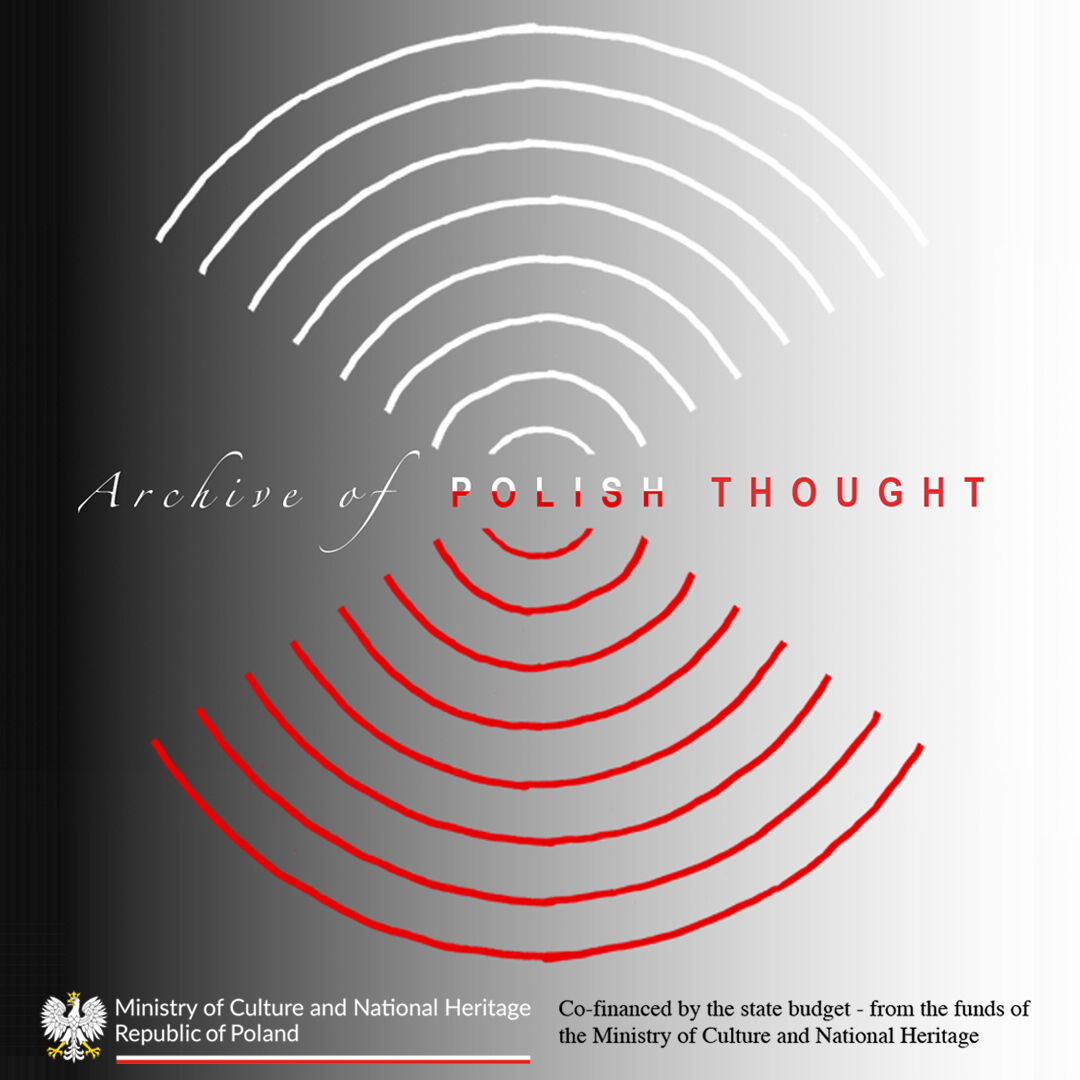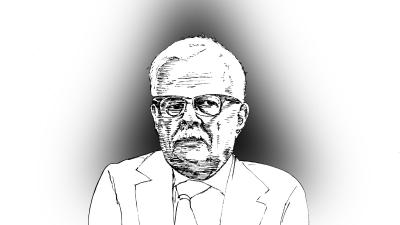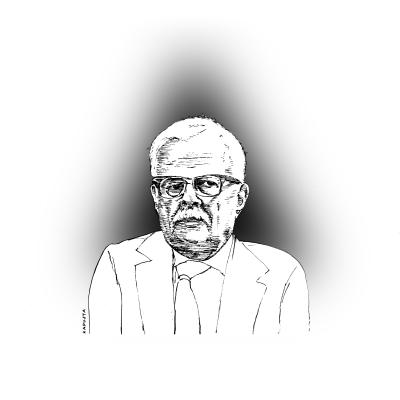FROM A CULTURAL NATION TO A POLITICAL NATION?
1. The title of this essay, intentionally flagged with a question mark, signifies the distinction itself is not entirely clear and that the real and desirable development of a nation does not proceed from one form to another. Let us start with some quotes from Norwid’s letter, which contains significant suggestions about the character of our nation and, I believe, a nation in general.
“This is the Polish community! - the community of a nation which, I do not deny, is as great in its patriotism as it is void as a society. [...] We are no society. We are a great national banner. [..] If I had a rope around my neck today, I would still croak with my throat tight that Poland is the last society on the globe, and the first nation on the planet. [...] If our Homeland were as valiant a society in all human duties as it is an outstanding nation in all Polish sentiments, then we would stand on both feet, whole and serious individuals - monumentally remarkable”.[1]
The distinction made by Norwid originates from Rousseau and Herder, and at the beginning of this century it was expressed by Friedrich Meinecke as follows: “we can still divide nations into cultural nations and political nations, nations that are primarily based on some jointly experienced cultural heritage and nations that are primarily based on the unifying force of a common political history and constitution.”[2]Under the conditions of Poland’s lost independence, the understanding of the nation in terms of the dominant religion, shared culture, language, history, and myths, along with a living memory of their own state and, in part, a sense of ethnic community, had to dominate the collective consciousness, pushing into the background the political understanding of the nation as a community of citizens (comprising, incidentally, a small portion of the population) of the pre-partition Rzeczpospolita. The process of political emancipation of the third estate began here much later than in the Western absolute monarchies undergoing modernisation processes, where the centralisation of power and economic development favoured moving away from local communities as the basis of identity to a universal community, namely the state, and a close association of the nation with its political structures.
The 19th century saw the development of nation-states and nations defining themselves by a common state. The Polish cultural understanding of the nation, which was similar to the German at the time, was not only shaped by the lack of an own state but was to a significant extent linked to a sense of injustice, especially among the upper classes, resulting from subjugation to states and their nations with distinct cultures, often a different religion, and a history fraught with conflicts with the Polish state, which no longer existed. A feature of Polish national consciousness was, therefore, a sense of distinctiveness combined with hostility towards the partitioning states and the nations organised within them, which manifested in the form of armed uprisings but also successful economic rivalry (not only in Wielkopolska but also in the Russian partition in and around Łódź). As a result of these circumstances, there was a growth in national awareness that extended to even those social strata where local identity had been dominant.
From this perspective, it can be argued that the partitions were a factor accelerating the development of national consciousness, which Norwid in 1862 described as patriotism. The January Uprising, which was soon to break out while revealing the actual extent of this awareness, also represented an essential stage in this process. In a contrasting juxtaposition made by Norwid, „feeling”, or emotionally determined perception, is opposed to the rational understanding of human duties, namely, civic and social responsibilities (which involve taking responsibility for creating and maintaining the forms of social life organisation - institutions that fill the space between the family and the state). According to him, these duties were not fulfilled sufficiently, failing to produce a strong enough fabric of moral and institutional bonds that would complement the culturally defined basis of national identity. That is why Poles did not stand „on both feet”, and they were not „whole and serious individuals”. In fact, Norwid did not disregard the cultural basis of national identity but called for its complementation and balance with the construction of a „society” that would represent an incomplete form of a political nation, given the lack of their own state.
The time this thought was formulated determined its radical form and undeniable simplification. After all, we know that in reality, especially in the second half of the 19th century, particularly in the Austrian and Prussian partitions, and to some extent in the Russian partition, depending on how far the occupying powers managed to transform into states governed by law, Poles, the descendants of the inhabitants of the First Polish Republic, and therefore not always ethnically homogeneous, effectively built intermediary institutions and even had some involvement in state affairs through their political representations, albeit these were not states that could be considered their own, and thus influenced the fate of the Polish community. If we were indeed just a nation and not a society, it would be difficult to understand how re-establishing an independent state like the Second Polish Republic was possible. If we were just an ethnic, we would be a state in name and customary symbolism only. The creation of a state was a result not only of independence aspirations and patriotic fervour but, above all, an outcome of transferring vital institutional resources and experience from institutions that existed before the regaining of independence to the newly formed body (we remember, for example, how long we had been using the law shaped in the partitioning states before it was unified).
2. Recalling these distant yet widely known circumstances was, in my view, necessary because the recovery of independence in 1989 placed us in a similar situation. We survived communism as a nation in the cultural sense, almost ethnically homogeneous as a result of the war. However, have we managed to survive as a political nation? Everything seems to suggest that we have not. After all, we lived under the pressure of a totalitarian state, and any intermediary institutions were not of a real nature if they were controlled by that state. Realists, describing the final stage of communism in Poland, saw the incomplete sovereignty of Poland as a factor favouring the revival of the political basis of national identity. After all, critics of such a stance emphasised the significance of the cultural identity of the nation, which made it possible to resist the totalitarian state and to build moral and institutional bonds in areas snatched from the control of the communist state. The Catholic Church in Poland was, in equal measure, an institution creating spheres of freedom for a significant part of Polish society, and in the attitudes and actions of its members it found support and assistance in building lasting bonds independent of the state. The ability to self-organise was thus made possible by the “feeling” of national identity and the preserved - thanks to the successful defence of areas of freedom - institution-building skills, of which Solidarity was a particularly striking exemplification. Social memory in those regions of Poland where there were several generations of self-governing traditions, strengthened by the “Solidarity” experience, made itself known in the independent state.
3. After 1989, the West looked with concern at the countries that had only just freed themselves from the grip of communism and yet seemed to be losing their freedom again under the yoke of nationalism. The resurgence of nationalism was given this pejorative label because it was believed that the former communist countries, having been held back in their development, had not undergone the subsequent phases of modernisation that occurred in the West after World War II. Inevitably, therefore, in this region of Europe, long considered backward, a sense of national identity built on cultural and ethnic foundations was bound to emerge. Reference was made to earlier theories, which saw a straightforward correlation between the modernisation process (the development of a market economy, industrialisation, urbanisation, increased social mobility within and between societies, the speed and ease of communication, etc.) and the decline of nationalism and regionalism.
After all, as early as the 1970s, an increase in the dynamics of ethnic and regional movements began to be noticed in an integrating and seemingly uniform Europe. Arend Lijphart is regarded as the researcher who provided the most complete explanation of the resurgence of ethnicity in industrial societies[3].In Central and Eastern Europe, officially, ethnic and regional differences were supported by the communist state; however, in reality, this support often meant control and, at times, brutal assimilation policies towards national minorities. Nationalist and regional movements were rigidly controlled. The overthrow of communism revealed with great force ethnic and religious tensions in the Balkans, but the processes of regaining sovereignty by the countries in Central and Eastern Europe, both those that were formerly within the sphere of influence of the USSR (the so-called socialist bloc) and those that were union republics, also carried a strong nationalist undertone. In fact, it was difficult to expect a different course for the process of restitution or establishment of independence (Poland, the Baltic states, and Ukraine) other than through reference to the history of the nation and possibly its earlier statehood, regardless of the extent to which the awareness of national and state identity might have been mystified[4].
The rebirth and outward expression of national identity were necessary conditions for strengthening the processes of liberation from dependence on both the internal communist system and the communist hegemon of this part of Europe, which was the USSR and later Russia, with its imperial ambitions. The manifestation of national identity and national-religious conflicts are all too easily characterised by Western politicians and observers, as well as some journalists in the region of Europe we are interested in, as nationalism, which in their view is an intrinsically harmful and often violent phenomenon (Yugoslavia).
In Western Europe, where modernisation processes are more advanced, there has by no means been a complete disappearance of the cultural and ethnic understanding of the nation. On the contrary, ethnic and regional movements, combined with demands for autonomy and sometimes independence, have been on the increase over the last thirty years. These movements are fundamentally peaceful (as seen in Scotland, Wales, and northern Italy), although they can also take on violent forms, as is the case with the Irish, Basque or Corsican conflicts.
Thus, there is no simple correlation between contemporary modernisation processes and the disappearance of a culturally rooted national identity. However, a general principle emerges on this occasion, which we also know from our own historical experience and that of our immediate neighbours, which involves the formation of a political nation as a result of reaching a certain level of national consciousness based on cultural and ethnic commonality. Undoubtedly, the long-lasting existence of nation-states is a factor strengthening the nation in the political sense, and in this respect, Poland and its neighbouring countries, due to the relatively short periods of their independence, still have a road ahead of them that is not free of obstacles. Nevertheless, as the experiences of several Western countries have shown, the disintegration of the nation-state under the influence of the independence aspirations of nations or ethnic groups living within it is not a phenomenon that has been eliminated as a result of modernisation.
4. From this perspective, the processes taking place in Poland by no means present themselves as a manifestation of historical backwardness, and our national feeling as a synthesis of nationalism, xenophobia, irrationality and a hatred of modernity. Certainly, however, regaining independence places before us the task of creating conditions that would ensure the sustainability of the state’s construction and enable it to confront the challenges and threats posed by international relations and the competition that comes with them. This task cannot succeed unless a political nation develops. On the one hand, it is the result of living in an independent state, but on the other hand, the political nation is a factor that strengthens the state itself.
In my opinion, the construction of the state from scratch, the establishment of the foundations of the political system, with a critical element being administrative reform and the creation of civil service, the transformation of the party system, citizen participation in democratic procedures, protection of fundamental civil freedoms, the promotion of entrepreneurship and local self-governance - all of these are processes and tasks (since we are in the phase of institution-building in a functional and moral sense) in which both the active part of Polish society and, albeit indirectly, the entire society are involved. In this way, a political nation, i.e. a real sovereign, is being formed before our eyes and with our participation. The essence of the change that is taking place consists precisely in complementing the national feeling hitherto based, among other things, on self-determination in opposition to the state, to a foreign sovereign, with an awareness of the inseparability of the state and the nation. For the Poles, this is already the third attempt in history, which this time has a chance of success. The effort to build a state is, therefore, a nation-building task, which, after all, could not succeed if we were not a nation in the cultural sense. The fullness of national existence implies a synthesis of both forms of the nation’s life. Strengthening the national state and the state nation is Poland’s raison d’état. In this way, an effective tool for pursuing the national interest is created. Not only internal transformations but also our international connections contribute to building the strength of our state. NATO membership will undoubtedly serve this purpose if we ensure that this organisation does not weaken as a result of concessions to Russia. Our integration with the European Union, preceded by a profound political reform, should contribute to strengthening the state nation by preserving our cultural distinctiveness on one hand and, on the other, through painstaking systemic and institutional work, without which we will find ourselves on the margins of the European Union, unable to secure the right conditions for achieving our goals. In fact, accession to the EU does not consist in passively submitting to all integration requirements (although some of them are indisputable, such as veterinary regulations) and thus relinquishing sovereignty. This form of sovereignty loss, as it is not a result of enemy invasion but adaptation to “European standards”, seems to those responsible for preparing Poland for integration an obvious necessity. However, we do not hear much about efforts aimed not only at obtaining more favourable conditions for accession but, above all, at defining our distinctiveness in various areas and delineating the fields of sovereignty. The European Union is not and will not be a super sovereign because it leaves to the member states a significant degree of sovereignty, which these states have, over time, ensured not only for their own needs but also with consideration for the needs of future members (the countries of Central and Eastern Europe), at that time still outside the Union[5]. It is, therefore, a matter of summoning up the courage to clearly define our national interest and the scope of sovereignty required to realise it.
We should also bear in mind the warning of the prophet Isaiah: “Behold, the nations are as a drop in a bucket, and are counted as the small dust on the scales” (Isaiah 40:15). Indeed, all the processes described, which can lead to the formation of a strong state and state nation, have their negative aspect, related to the bargaining nature of the democratic system. The modern democratic way of practising politics weakens the state and the state nation due to the ongoing struggle for privileges (which naturally leads to corruption)[6]. This mechanism also operates at the level of a union of states, such as the European Union, which the leaders of the Polish state seem to overlook. Both conservative and liberal politics must be wary of such a political practice, as it destroys the state by reducing it to a battleground for group interests. Then, neither the state nor freedom can be secured. In this way, the state nation, too, is degenerated. This implies the need for continuous reflection and analysis of political institutions and a bold advocacy of their changes.
[1] C. K. Norwid, List do Michaliny z Dziekońskich Zaleskiej, Paryż 14 listopada 1862 r., [w ]: C. Norwid, Pisma wybrane. Listy, t.5, wybór i objaśnienia J.W.Gomulicki, third edition amended, Warszawa 1983 (1968), p. 496.
[2] F. Meinecke, Weltbürgertum und Nationalstaat, München 1969, p. 2, [after:] U. Altermatt, Sarajewo ostrzega. Etnonacjonalizm w Europie, Kraków 1998, pp. 35-36.
[3] G. Babiński, „Nacjonalizmy czy regionalizmy? Ruchy etnoregionalne w Europie”, [w:] Europa państw – Europa narodów. Problemy etniczne Europy środkowo-wschodniej, pod red. G. Babińskiego i W. Miodunki, Kraków 1995, p. 50.
[4] Cf. M. Kuniński, „Wobec wolności. Społeczeństwa Europy Środkowo-wschodniej a integracja europejska”, [w:] Słowianie wobec integracji Europy. Prace poświęcone XII Międzynarodowemu Kongresowi Slawistów, pod red. M. Bobrownickiej, Kraków 1998.
[5] I would like to thank Mr Andrzej Sadowski of the Adam Smith Centre in Warsaw for drawing my attention to the important extent of the freedom to shape the sovereignty of individual EU Member States, inter alia in the field of tax policy, which, because of its connection with the activities of the legislature, has long been regarded as one of the attributes of a sovereign state.
[6] Cf. MM. Kuniński, Friedricha A. von Hayeka pozytywna krytyka demokracji, [w:] „CIVITAS. Studia z filozofii polityki”, nr 2, Warszawa 1998, pp. 139-160.







Comments (0)